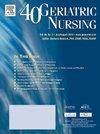认知障碍与老年心血管疾病患者药物依从性评分的关系,包括心理方面
IF 2.5
3区 医学
Q3 GERIATRICS & GERONTOLOGY
引用次数: 0
摘要
本研究考察了老年心血管疾病患者的认知障碍和药物依从性评分(包括心理方面)之间的关系。本观察性研究纳入163例因心血管疾病住院的老年患者(中位年龄:74岁;男性,61%)。出院时的药物依从性通过四个领域的12项量表进行评估:药物依从性,与医疗保健提供者的合作,获取和使用药物信息的意愿,以及接受药物。认知障碍定义为痴呆快速筛查试验得分≤9分。认知障碍患者的药物依从性评分低于无认知障碍患者(p <;0.001),校正潜在混杂因素后。“与医疗保健提供者合作”和“获取和使用药物信息的意愿”得分存在显著差异。医疗服务提供者应根据患者的健康状况和认知功能定制药物信息共享。本文章由计算机程序翻译,如有差异,请以英文原文为准。
Association between cognitive impairment and medication adherence score, including psychological aspects in older patients with cardiovascular disease
This study examined the association between cognitive impairment and medication adherence scores, including psychological aspects, in older patients with cardiovascular disease. This observational study included 163 older patients hospitalized for cardiovascular disease (median age: 74 years; men, 61 %). Medication adherence at discharge was evaluated using a 12-item scale across four domains: medication compliance, collaboration with healthcare providers, willingness to access and use information on medication, and acceptance of medication. Cognitive impairment was defined as a score of ≤ 9 points in the rapid dementia screening test. Patients with cognitive impairment showed lower medication adherence scores than those without (p < 0.001) after adjusting for potential confounders. Significant differences occurred in the scores of “collaboration with healthcare providers” and “willingness to access and use information on medication”. Healthcare providers should tailor medication information sharing according to the patients’ health condition and cognitive function.
求助全文
通过发布文献求助,成功后即可免费获取论文全文。
去求助
来源期刊

Geriatric Nursing
医学-护理
CiteScore
3.80
自引率
7.40%
发文量
257
审稿时长
>12 weeks
期刊介绍:
Geriatric Nursing is a comprehensive source for clinical information and management advice relating to the care of older adults. The journal''s peer-reviewed articles report the latest developments in the management of acute and chronic disorders and provide practical advice on care of older adults across the long term continuum. Geriatric Nursing addresses current issues related to drugs, advance directives, staff development and management, legal issues, client and caregiver education, infection control, and other topics. The journal is written specifically for nurses and nurse practitioners who work with older adults in any care setting.
 求助内容:
求助内容: 应助结果提醒方式:
应助结果提醒方式:


